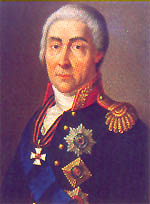Alexander Alexandrovich Prosorovsky
Prince Alexander Alexandrovich Prosorowski ( Russian Прозоровский, Александр Александрович ; * to 1733 ; † August 9 . Jul / 21st August 1809 greg. In Moscow ) was a Russian field marshal .
Life
Origin and family
Alexander came from a line of the Rurikid dynasty from Yaroslavl , which named itself Prosorowo after its ancestral estate since the 15th century . His parents were Prince Alexander Nikititsch Prosorowski (1687-1740) and Anna Borisovna, nee Princess Golitsyna (1686-1772).
He married Princess Anna Mikhailovna Volkonskaya (1749-1824), a daughter of Mikhail Nikititsch Volkonsky (1713-1788). The marriage resulted in two daughters and two sons.
Career
Prosorowski was drafted into the Land Cadet Corps of the Imperial Russian Army in 1742 and was promoted to NCO in 1744 and a Fourier in 1746 . In 1754 he moved from the guard to a field regiment and was promoted to captain in 1756 . He took part in the Seven Years' War and was wounded in the battle of Groß-Jägersdorf . He then took part in the siege of Küstrin in 1758 and was wounded again in the Battle of Zorndorf . After his participation in the Battle of Kunersdorf he got in December 1759 to lieutenant and in January 1760 to first lieutenant on.
In 1764 he was promoted to brigadier and in 1766 to major general . In the same year he was sent against the Bar Confederation . His actions were also successful in the Russo-Turkish War . In 1783 he consequently advanced to lieutenant general . In 1777 he was given a health-related leave of absence, but was able to distinguish himself again in the Crimea in 1778 .
Prosorovsky was appointed governor-general of Oryol and Kursk in 1781 , but he only accepted this appointment on condition that he would remain on the lists of the Russian army. In July 1782 he was appointed senator, while at the same time being excluded from the regular army lists, his applications for re-entry into the army were unsuccessful. He resigned from his civil offices on December 21, 1783 and spent the next six years as a landlord in the country, devoting himself to personal literary work and organizing his notes and memories of past campaigns. At the beginning of March 1790 he was then surprisingly appointed Governor General of Moscow by Catherine II , who was responsible for the troops in Moscow, the provinces of Moscow and Smolensk and those of Belarus. After five years in office, he was removed from this post as governor-general on March 21, 1795, but was awarded the Order of St. Vladimir 1st class and an annual pension of 12,000 rubles as well as the title of head of the Moscow Grenadier Regiment. Paul I brought him back into the army and in 1796 appointed him commander of the 1st Smolensk Division with a simultaneous promotion to general of the infantry . Again he was sent to his estate and only Alexander I brought him back to the court in 1805. In 1807 he appointed Prosorovsky field marshal and commander in chief of the Russian armed forces in Moldova . Because of his advanced age, Kutuzov was put at his side, and he became a great patron.
Prosorowski was the bearer of the Order of St. Andrew the First Called , the Order of Vladimir I Class (1795), Alexander Nevsky Order , the Order of St. Anne (1766) and the Order of St. George II Class (1778) .
literature
- Александр Александрович Прозоровский . In: Русский биографический словарь , Volume 15, 1910, pp. 4–11 ( Wikisource ; Russian)
Web links
- Александр Александрович Прозоровский ( biogram , Russian)
Individual evidence
| personal data | |
|---|---|
| SURNAME | Prosorowski, Alexander Alexandrovich |
| ALTERNATIVE NAMES | Прозоровский, Александр Александрович (Russian) |
| BRIEF DESCRIPTION | Russian field marshal |
| DATE OF BIRTH | around 1733 |
| DATE OF DEATH | August 21, 1809 |
| Place of death | Moscow |

